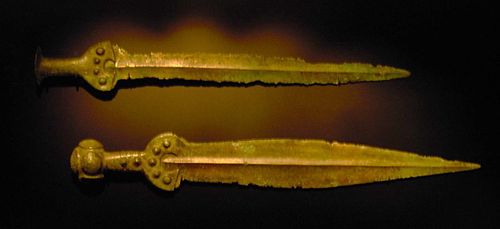Swordnoun
(weaponry) A long-bladed weapon with a hilt, and usually a pommel and cross-guard, which is designed to stab, slash, and/or hack.
Swordnoun
(tarot) A suit in the minor arcana in tarot.
Swordnoun
(tarot) A card of this suit.
Swordnoun
(weaving) One of the end bars by which the lay of a hand loom is suspended.
Swordnoun
(heraldry) The weapon, often used as a heraldic charge.
Swordnoun
An offensive weapon, having a long and usually sharp-pointed blade with a cutting edge or edges. It is the general term, including the small sword, rapier, saber, scimiter, and many other varieties.
Swordnoun
Hence, the emblem of judicial vengeance or punishment, or of authority and power.
Swordnoun
Destruction by the sword, or in battle; war; dissension.
Swordnoun
The military power of a country.
Swordnoun
One of the end bars by which the lay of a hand loom is suspended.
Swordnoun
a cutting or thrusting weapon with a long blade
Sword
A sword is an edged, bladed weapon intended for manual cutting or thrusting. Its blade, longer than a knife or dagger, is attached to a hilt and can be straight or curved.
Sabrenoun
A light sword, sharp along the front edge, part of the back edge, and at the point.
Sabrenoun
A modern fencing sword modeled after the sabre.
Sabreverb
To strike or kill with a sabre.
Sabrenoun
See Saber.
Sabrenoun
a fencing sword with a v-shaped blade and a slightly curved handle
Sabrenoun
a stout sword with a curved blade and thick back
Sabreverb
cut or injure with a saber
Sabreverb
kill with a saber
Sabre
A sabre (sometimes spelt saber in American English) is a type of backsword with a curved blade associated with the light cavalry of the early modern and Napoleonic periods. Originally associated with Central European cavalry such as the hussars, the sabre became widespread in Western Europe in the Thirty Years' War.































